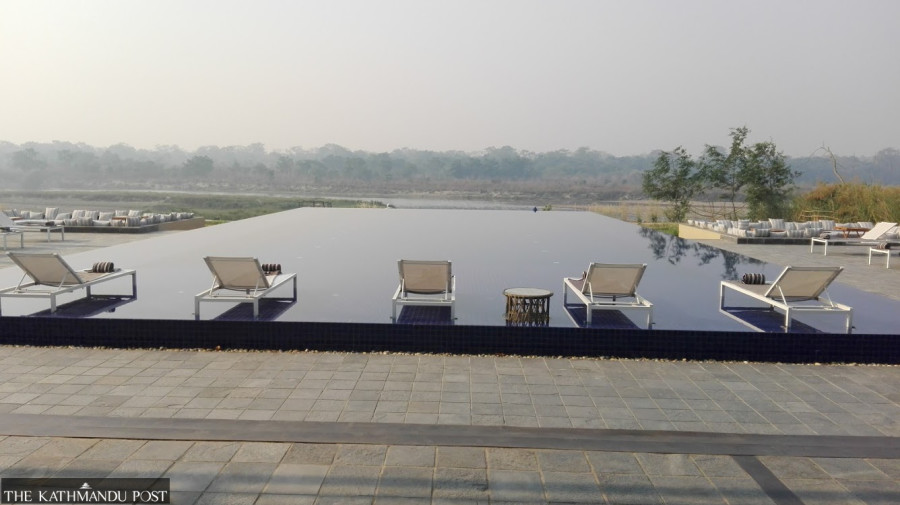Money
Nepal's luxury hotels struggle to recover amid massive losses
The hotel industry has posted the highest-ever losses in the last fiscal year ended mid-July.
Sangam Prasain
Travel restrictions and an economic slowdown triggered by the Covid-19 pandemic have delivered a massive wallop to Nepal's luxury hotels, decimating revenues and profits, and the dazed hospitality industry is still struggling to recover amid huge losses.
The country’s posh hotels have posted the highest-ever losses in the last fiscal year ended mid-July; and based on the current scenario, mainly tourist arrival figures, the industry could take up to two years or more to return to pre-Covid levels, insiders say.
“The hotel industry has been left in a state of total disarray. It will take years for the sector to recover,” said Yogendra Sakya, a hotel entrepreneur. “If there is no new variant, we can expect a speedy recovery within two years. It will depend on the vaccination drive.”
But amid the gloom, there is a silver lining as increasing free independent travellers from the United States and Europe have been travelling to Nepal despite warnings from their governments.
“These are ‘cowboys’ who love adventure travel no matter what the circumstances are.”
Nepal’s hospitality business suffered a prolonged recession due to global travel restrictions.
This is evident from the financial reports of the three hotels listed on the Nepal Stock Exchange. Hoteliers said that the situation of these Kathmandu-based hotels gives an authentic picture of the situation of other luxury hotels and resorts.
According to the financial reports for the fourth quarter of 2020-21 ended mid-July, Oriental Hotel Limited, which operates the five-star Radisson Hotel in Kathmandu, was the top loser as the property was closed for almost a whole year.
In its financial report, the hotel said it posted a net loss of Rs260.47 million in the last fiscal year. The hotel’s net profit plunged by 489 percent, according to its financial statement.
The hotel's total income or revenue in the previous fiscal year 2019-20 was Rs599.36 million, which dropped by a staggering 89.50 percent to Rs62.69 million.
“The government enforced the lockdown on March 24, 2020, and continued it until July 21. Although hotels were allowed to operate by following health safety protocols, tourist numbers fell to rock bottom. All meetings and conferences were restricted that resulted in the complete closure of the hotel,” the hotel said in its financial statement.
“The hotel had to suffer almost zero income during this period. As the government has announced vaccinating most of the population by April 2022, we expect that the tourism industry will recover to the pre-Covid level.”
Pawan Rajbhandari, director of sales and marketing at the Radisson Hotel Kathmandu, says the daily average occupancy of the hotel currently hovers around 20 percent, following the reopening of the tourism sector in September. “It's survival of the fittest for the hotels.”
On September 23, Nepal dumped the seven-day quarantine requirement and resumed issuing on-arrival visas to all vaccinated foreign travellers in a bid to bring its virus-ravaged tourism industry back to life.
Travel and tourism businesses, which accounted for around 8 percent of the country's gross domestic product and provided more than 1.05 million jobs directly and indirectly in pre-Covid days, were the hardest hit after travel restrictions came into force in late March last year.
Rajbhandari said that reservation inquiries had been encouraging. “The government announcement about the reopening was a bit late.”
According to him, the United Kingdom government's declaration removing Nepal from its no-go zone will boost the tourism industry.
From October 11, arrivals from 47 countries, including Nepal, to the UK will no longer have to enter hotel quarantine. They will just have to do a PCR test on or before day 2.
After the Radisson Hotel Kathmandu, the Soaltee Hotel saw the biggest fall in revenue. The hotel posted a net loss of Rs186.04 million in the last fiscal year, from a Rs112.04 million net profit in the previous fiscal year.
The hotel's total income was Rs1.26 billion in 2019-20, which dropped to Rs431.37 million in the last fiscal year, representing a 65.87 percent plunge year-on-year.
The hotel has been operating under its brand The Soaltee Kathmandu after the management contract with Holiday Inns (China) of the Intercontinental Hotel Group ended on May 14, 2021. The hotel said that they were expecting some recovery in this fiscal year due to the vaccination drive, although the risk of the new variant still remains.
Taragaon Regency Hotels posted a net loss of Rs49.64 million in the last fiscal year as against a net profit of Rs177.41 million in the previous fiscal year. The hotel said that until the entire population was vaccinated, Nepal’s tourism sector would not recover.
Taragaon's annual income fell to Rs283.22 million in the last fiscal year from Rs1.02 billion in the previous fiscal year 2019-20.
“The Covid-19 pandemic has reduced the number of travellers, the country observed an overgrowth in hotel numbers. The country lacks proper tourism infrastructure. There is fluctuation in the exchange rate. All these factors have been affecting the industry,” Taragaon Regency said in its financial statement.
Tourism-dependent Nepal hosted 230,085 foreign tourists in 2020, a drop of more than 80 percent compared to 2019, reminiscent of the arrival figure of 1986. As of September, total international arrivals to Nepal had reached just 76,864 individuals.




 11.12°C Kathmandu
11.12°C Kathmandu













